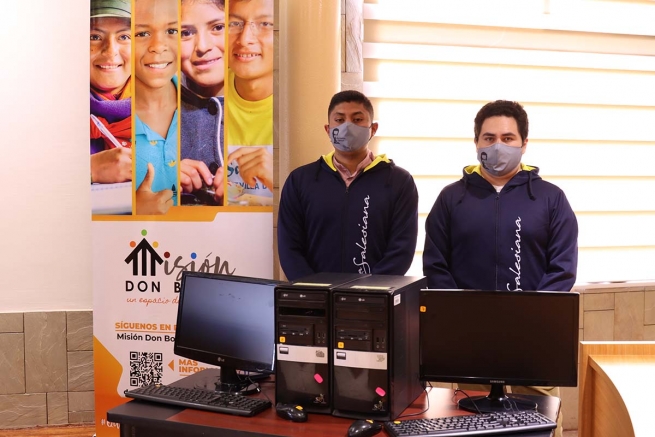
GLOBAL: Youth shaping global trends, says report
Salesian Missions programs empower vulnerable youth through education, support and youth-led initiatives
NEW ROCHELLE, NY (Jan. 28, 2021) “Youth movements are shaping global trends” is one the three key opportunities identified in the Global Humanitarian Overview 2021 from the United Nations Office for the Coordination of Humanitarian Affairs (OCHA). According to the report, “This new level of engagement presents a unique opportunity for the international humanitarian system to integrate youth perspectives and leadership, ensuring humanitarian action is more inclusive for young people.”
The opportunity comes at a time when youth are facing increasing difficulties, according to the report, which adds, “Economic and employment prospects for young people—already tough before the pandemic—have become even more dire.”
“The proportion of youth who are not engaged in employment, education or training activities has remained stubbornly high over the past 15 years. It now stands at 30 per cent for young women and 13 per cent for young men worldwide. An estimated 600 million jobs would have to be created over the next 15 years to meet youth employment needs,” states the report.
Working in more than 132 countries around the globe, Salesian missionaries focus on empowering youth and providing them with opportunities to use their talents and make their voices heard. The wide range of programs offered includes skills development in more than 1,000 vocational, technical, professional and agricultural schools.
Ensuring job training for youth at risk of trafficking
In Ghana, Salesian missionaries operate four centers across the country that serve poor youth who are at risk of exploitation, child labor and human trafficking. There are two centers in the urban area of Accra, a center in Tatale and one in the city of Sunyani.
Salesian Technical School, located in Tatale, has recently started courses in construction, catering and electricity. The new courses provide both classroom learning and hands-on experience in the field, so that youth can demonstrate their practical experience when applying for work.
Many youth gain employment from the internships that they have as part of their education, which makes the transition from school to work easier.
“Youth at these Salesian centers are provided social services, including shelter and nutrition, and also have access to education and skills training so they are able to find and retain stable employment and become self-sufficient,” said Father Gus Baek, director of Salesian Missions, the U.S. development arm of the Salesians of Don Bosco. “Part of the goal of providing education in employment sectors that are hiring is to discourage youth from leaving Ghana and seeking employment in other countries where they often fall victim to human trafficking and other risks.”
Strengthening youth-led initiatives
Students at the Salesian Polytechnic University campus in Quito launched the “Donate your computer” initiative to bring technology tools to students for remote learning access. The 30 computer science course students who started the project hope to provide technology tools to vulnerable populations in 12 cities across the country.
The initial goal is to provide 500 technological tools—including tablets, laptops, PCs and keyboards—so that children and older youth can attend virtual lessons, do their homework and maintain hope for a better world through education.
One of the students taking part in the initiative said, “Thank you for giving us the opportunity to demonstrate what it means to be good Christians and upright citizens.”
Salesian University offices on the campuses in Quito, Guayaquil and Cuenca are donation collection centers. An IT application was also developed that allows donors to know the status and destination of what they have donated, providing transparency. The evaluation and repair of the equipment are handled by students in the system’s engineering and computer science courses. The Salesian Province of Ecuador, Don Bosco Mission and Salesian Polytechnic University collaborated on the project.
María Rosa Chasiluisa, who lives south of Quito and has six children, was one of the recipients of the donation. She said, “Thank you very much for giving this help to my children. I’m very happy because with this computer, they can make a career for themselves. I felt bad because my children, many times, were unable to connect to lessons or send their homework on time.”
According to UNICEF, only 37 percent of families in Ecuador have internet connection. In rural areas, only 16 percent of households have network connectivity. This means that these children cannot study at home, which has been critical since many areas are focused on remote learning during the coronavirus pandemic.
Giving vulnerable youth opportunities
At Don Bosco Snehalaya, located in Guwahati within the Indian state of Assam, Salesians of Don Bosco operate five homes for poor and orphaned youth in the region, as well as educational programs, summer activities and more through the support of Salesian Missions donor funding.
When there are not lockdowns in place, children in the five homes go to school for the day, and in the evening, they engage with their peers in social activities or receive extra help with their schoolwork.
“Students who did not perform well in school are being given extra tutoring in the evening so they can do better and keep up with other students,” said Father Thadeus Kujur, director of Don Bosco Snehalaya. “The situation with the pandemic is difficult because children have not been able to participate in their normal activities and are missing time in school. Staff at Don Bosco Snehalaya have been supporting students and their families as much as we can right now.”
In addition to education, youth are provided health checkups, individual and group counseling. Students have also participated in anti-child labor, anti-child abuse and anti-trafficking activities to bring about more awareness of and exposure to these issues.
###
Contact: [email protected]
